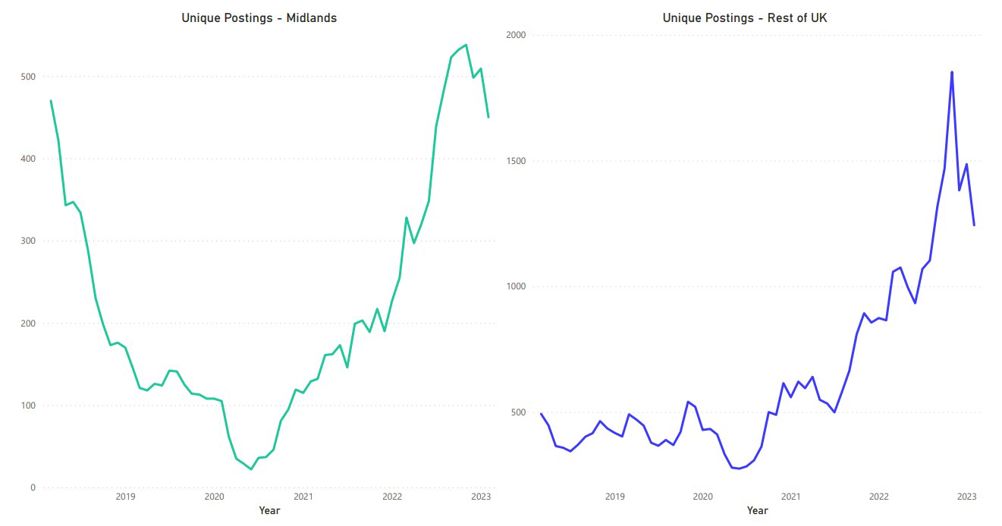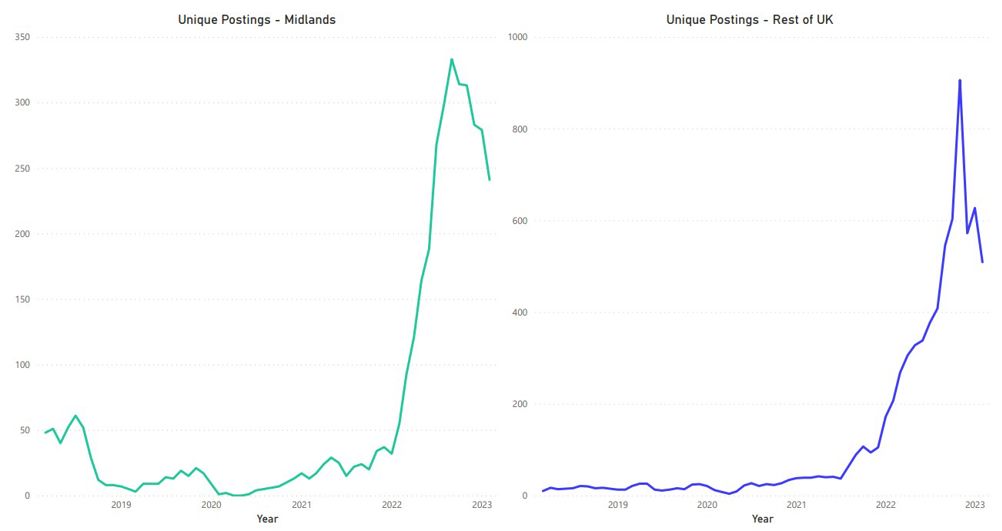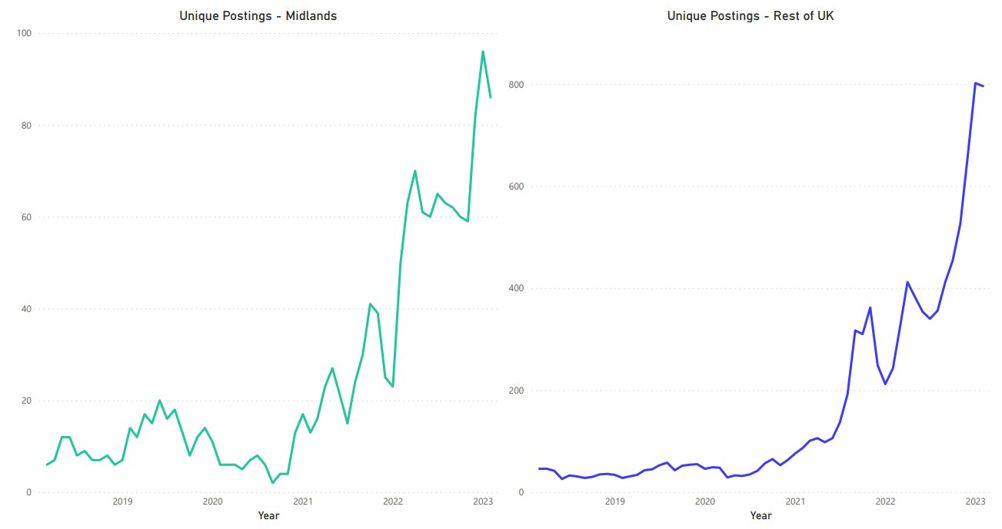The Midlands has a long history as a centre for automotive manufacturing and research and development. It is a key manufacturing location for many automotive manufacturers including Dennis Eagle, GKN Driveline, Toyota Motor Manufacturing, and the UK’s second largest automotive manufacturer, Jaguar Land Rover (JLR). Cars manufactured in the Midlands by JLR and Toyota make up about 44% of the UK’s vehicle production by value.
In response to the UK Government’s decarbonisation policies, the region has also been positioning itself as a specialist in emerging future mobility technologies. This article examines the labour market for the skills the Midlands will need to fulfil its ambitions in low carbon mobility. We have focussed on the low carbon automotive sector, although the region also has ambitions in other low carbon mobility sectors, such as aerospace.

Fig. 1 shows the number of unique Engineering and Manufacturing job postings in the Midlands by companies involved in Manufacture of motor vehicles, trailers, semi-trailers, and other transport equipment. Unique job postings declined rapidly in the Midlands after 2017, before slumping in the early part of the Covid pandemic and accelerating steeply afterwards. The decline in the Midlands data after 2017 mirrors the fortunes of the automotive manufacturing sector, with car production declining from its peak in 2016, and slumping during the pandemic. The chilling effects of Brexit uncertainty are perhaps evident in the pre-pandemic decline.
As demonstrated in Fig. 2 the labour market in the Midlands has begun adjusting to reflect the skills needed to meet low carbon requirements, including the manufacture of electric and hybrid vehicles, with demand increasing

Fig. 3 provides a flavour of what the growing demand for skills in this area actually means in terms of the kind of roles that recruiters are advertising for. Unsurprisingly, it points to an increasing requirement for engineers with expertise in battery technology, power electronics, and electric motor design.
The Midlands is also an important centre for the development of hydrogen fuel cell technology, an alternative form of low carbon mobility which offers the benefit of only emitting water and heat in the creation of electricity. The region is home to several organisations focussed on the development and commercialisation of this technology, including the UK Battery Industrialisation Centre and the Centre for Hydrogen and Fuel Cell Research. Fig. 4 shows that demand for hydrogen skills in the Midlands is starting to increase, as these technologies are developed further.

In shifting to the production of low carbon automotive technologies, the Midlands is faced with significant challenges in obtaining the skilled workforce required. While many automotive skills transfer across from internal combustion to low carbon vehicles, many of the components and manufacturing processes for low carbon vehicles require new skills.

To address this skills shortage, government and industry are working together to develop training programmes and apprenticeships that focus on low technologies. The Institute for Apprenticeships and Further Education (IfATE), for example, is currently working on a proposal to develop an apprenticeship for Battery Manufacturing Technician, while Enginuity is working with the Auto Council Skills Working Group and DTB to develop and run a pilot of an Upskilling Ecosystem including an intelligent platform which allows employers to match their upskilling requirements to local training provision. The Ecosystem will be designed to bring together the key initiatives in the sector including the skills foresighting hub and the National Electrifications Skills Framework and Forum.
As its automotive manufacturers shift to low carbon vehicle manufacturing, the Midlands needs to work with education and skills stakeholders, to ensure its talent pipeline delivers the new skills it requires, and its existing workforce has the opportunity to upskill effectively.
Comment: Anne Watson - CEO, Enginuity
The automotive industry across the UK is changing to meet the Government’s decarbonisation policies and changing consumer demand. The Midlands is at the forefront of that shift towards future mobility technologies, and it is starting to transform the sector’s skills landscape in the region. While many automotive skills transfer across from internal combustion to low carbon vehicles, new components and manufacturing processes require new skills. The Midlands has a history of adapting to change and has a strong foundation of engineering expertise, making it well-positioned to lead the way in low carbon mobility. Enginuity is developing a skills framework for Engineering and Manufacturing to deliver a range of accessible tools that help engineers transfer and upskill, while also assisting employers in identifying new talent sources. Furthermore, Enginuity is delivering insightful skills intelligence and sector wide collaboration, which will help the Midlands make the most effective sustained investment in skills development and take best advantage of the training programmes and apprenticeships, being developed by Government and industry, that focus on low carbon technologies.
Enginuity is a registered charity which acts as the sector connector for the advanced manufacturing and engineering industry. The organisation marries engineering skills with ingenuity with data to design and constantly improve tools and solutions that enable individuals, employers, education providers and governments to plan and meet their skills and workforce needs. Visit enginuity.org to find out more.

Glasgow trial explores AR cues for autonomous road safety
They've ploughed into a few vulnerable road users in the past. Making that less likely will make it spectacularly easy to stop the traffic for...